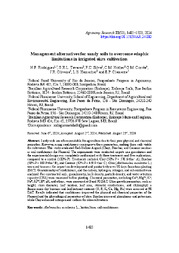Management alternatives for sandy soils to overcome edaphic limitations in irrigated okra cultivation.
Management alternatives for sandy soils to overcome edaphic limitations in irrigated okra cultivation.
Author(s): RODRIGUES, N. F.; TAVARES, S. R. de L.; SILVA, F. C.; HÜTHER, C. M.; CORRÊA, G. M.; OLIVEIRA, J. R.; HAMACHER, L. S.; CLEMENTE, E. de P.
Summary: Sandy soils are often unsuitable for agriculture due to their poor physical and chemical properties. However, using conditioners can improve these parameters, making these soils viable for cultivation. This study evaluated Red-Yellow Argisol (Clay), Biochar, and Ceramic residues as soil conditioners for Planosol. The experiments were conducted in pots in a greenhouse and the experimental design was completely randomized with three treatments and five replications, compared to a control (100% P). Treatments included Clay (50% P + 570.6 t ha-1 A), Biochar (50% P + 189.9 t ha-1 B), and Ceramic (50% P + 459.9 t ha-1 C). Okra (Abelmoschus esculentus L.) was used to assess the impact on development and productivity over 90 days from transplanting (DAT). Granulometry of conditioners, and the carbon, hydrogen, nitrogen, and ash content were analyzed. For constructed soils, granulometry, bulk density, particle density, and water retention capacity (CRA) were measured before planting. Chemical parameters, including Ca²?, Mg²?, K?, Na?, Al³?, H?, pH, and others, were measured at 0 and 90 DAT. Okra growth parameters, such as height, stem diameter, leaf number, leaf area, stomatal conductance, and chlorophyll a fluorescence dry biomass and leaf nutrient contents (N, P, K, Ca, Mg, Na) were assessed at 90 DAT. Results indicated that conditioners improved the physical and chemical properties of the Planosol and the physiological parameters of okra. Biochar increased phosphorus and potassium, while Clay enhanced nitrogen and sodium for okra cultivation.
Publication year: 2024
Types of publication: Journal article
Unit: Embrapa Soils
Observation
Some of Embrapa's publications are published as ePub files. To read them, use or download one of the following free software options to your computer or mobile device. Android: Google Play Books; IOS: iBooks; Windows and Linux: Calibre.
Access other publications
Access the Agricultural Research Database (BDPA) to consult Embrapa's full library collection and records.
Visit Embrapa Bookstore to purchase books and other publications sold by Embrapa.

